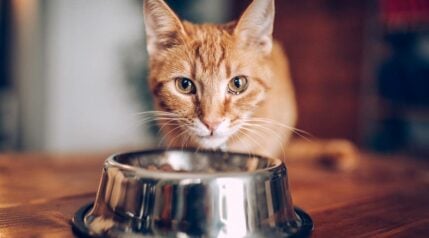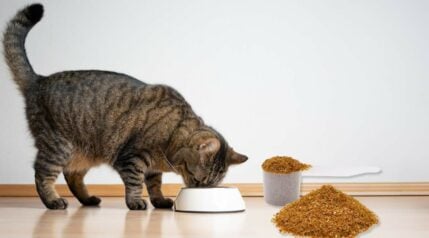When you purchase through links on our site, we may earn a commission. Here’s how it works.
Pomegranates are low-calorie, nutrient-dense fruits packed with vibrantly colored edible seeds. Eating pomegranate seeds provides various nutrients, including fiber, folate, vitamin C, potassium, and magnesium. Humans use pomegranates medicinally for antioxidant, antimicrobial, and anti-inflammatory support. Healthline says pomegranates may benefit heart, urinary, brain, and digestive health. Do any of these benefits extend to cats? Can cats even eat pomegranates safely?
Pomegranate
As one of the world’s most-ancient fruits, the pomegranate has a rich and colorful history. Believed to have originated in Persia—modern-day Iran—the cultivation of the pomegranate eventually spread throughout Asia (Afghanistan, China, India, etc.), Mediterranean Europe, and North Africa. According to the United Nations Economic Commission for Europe (UNECE), the leading producers of pomegranates today are India and China, followed by Iran, Turkey, Afghanistan, the United States, Iraq, Pakistan, Syria, and Spain.
The word pomegranate originates from the medieval Latin “pomum granatum,” meaning seeded apple. History of the pomegranate shows that it was one of the first five domesticated edible fruits, along with date, fig, palm, grape, and olive. Pomegranates symbolize fertility, health, and rebirth throughout ancient cultures.
In Greek mythology, the pomegranate tree is said to have sprung from the blood of Dionysus, the god of wine. The story of Persephone and Hades features the pomegranate, representing the indissolubility of marriage. Persian mythology says Isfandiyar ate a pomegranate and became invincible. The pomegranate seeds in a single fruit are said to number 613 in Judaism—one for each of the Bible’s 613 commandments. The Koran describes a heavenly paradise that contains fruits, including pomegranates. Buddhism says that the pomegranate is one of three blessed fruits, along with peach and citrus. Chinese ceramic art shows the pomegranate as a symbol of fertility, posterity, and a blessed future.
Open up this round, reddish-brown fruit to reveal seeds the size of corn kernels. Also known as arils, these seeds are crunchy, juicy, and bursting with sweet-tart flavor. Israeli, Middle Eastern, Indian, Mediterranean, and African cuisines use pomegranate seeds in sweet and savory dishes. Eat the seeds plain or sprinkle them on top of a yogurt bowl, salad, or smoothie. You’ll find that pomegranate seeds add brightness to a dish and make a good substitute for citrus. Pomegranate seeds are used in various preparations, including pomegranate juice and molasses.
Can Cats Eat Pomegranate Seeds?
If your cat is begging for crunchy pomegranate seeds, it will relieve you to know that this fruit is not toxic to cats. Yes, cats can eat pomegranates.
Cats are obligate carnivores, so it’s absolutely crucial that they get the proper nutrition without too many extra treats. Fruits are not part of a cat’s natural diet, so it’s not necessary or beneficial for them to eat fruit regularly. Unlike dogs, cats cannot easily digest or extract nutrients from plant-based foods. They rely almost entirely on meat to get what they need to stay happy and healthy. That being said, if your cat gets ahold of a runaway aril, don’t panic—pomegranate seeds are safe for cats to eat.
Just like with any new food, keep a close eye on your cat after giving them pomegranate seeds just in case they have an adverse reaction. If you notice anything wrong, call your vet right away so they can advise you on what you need to do next.
Is Pomegranate Safe For Cats?
Cats can eat pomegranates with a few caveats. When introducing a new food into your cat’s diet, give your feline a minimal amount to start. Allow your cat to taste a single pomegranate seed and check for any adverse effects in the following hours. If pomegranate suits your cat’s digestive system, you can try feeding them additional seeds.
Signs of indigestion or allergies include:
- Bloating and gas
- Diarrhea
- Discharge from eyes or nose
- Itching skin
- Vomiting
- Wheezing or sneezing
If your cat behaves abnormally after eating pomegranate seeds, contact your veterinarian immediately.
Do Cats Like Pomegranate Seeds?
We know cats can eat pomegranates, but do they like this fruit? As obligate carnivores, cats love meat-based snacks the most. From there, a cat’s preferences will vary. Cats lack sweet taste receptors, making them unable to taste sweetness in foods. They also tend to be drawn to high-fat or high-protein foods. Still, this doesn’t stop our furry friends from occasionally surprising us with their snack preferences.
Educate yourself on what human foods are safe for cats, and from there, you may allow your cat free reign to explore healthy food options that interest them. Felines are curious creatures and usually give food a sniff and a nibble before deciding.
You may find that your feline loves the crunchy texture and burst of hydration from this flavorful seed. If that’s the case, remember that all human food should be fed to cats in moderation. If you are concerned about how many pomegranate seeds your cat eats, consult your veterinarian.
Are Pomegranate Seeds Good For Cats?
While pomegranate seeds are packed with nutrients that make them healthy for humans, felines have evolved to get everything they need from a high-protein, meat-centric diet. If your cat eats minimal pomegranate seeds, as recommended, they will receive little nutritional value from this snack. Still, if your cat enjoys the texture or taste of pomegranate seeds, it’s okay to give them a few seeds here and there to make them happy. As cats are prone to urinary tract issues, pomegranates may benefit your kitty by adding an additional source of hydration to their diet.
When Are Pomegranates Bad For Cats?
Felines are not meant to eat plants, so too many pomegranate seeds could lead to gastrointestinal problems, including diarrhea and vomiting. As one pomegranate contains 38 grams of sugar, feeding your cat too many pomegranate seeds will likely upset their stomach. Pomegranates have lower sugar than some other common fruits but still have enough to cause digestive problems for our carnivorous cats, especially those that are diabetic or overweight.
Never feed your cat pomegranate juice or processed pomegranates, as they’ll likely contain more sugar and may have added colorants, flavors, or preservatives.
Pomegranate seeds may also become a choking hazard for your feline. Always supervise your cat when feeding them pomegranate seeds. If your cat tends to inhale their snacks without chewing, consider softer snack options that are safer and equally—if not more—pleasing to your furry friend.
What’s The Best Way To Share Pomegranate With Your Cat?
Give your cat a few pomegranate seeds without the rind as an occasional treat. Constantly monitor your cat when feeding them pomegranate seeds to ensure any choking doesn’t go unnoticed.
To successfully cut a pomegranate without breaking the seeds, remove both ends of the fresh pomegranate. With the top removed, you’ll see white membranes that divide the inside of the fruit. Starting at the top and moving down, use the white portions as a guide and make shallow cuts in the skin of the pomegranate. From there, hold the pomegranate and gently pull apart the pomegranate to divide the fruit into sections. Dislodge the pomegranates from the membrane and skin, allowing them to fall into a water bowl. Extra white pieces of the membrane will float to the top of the water, and the seeds will stay at the bottom. Scoop the membranes out of the water and throw them away. Drain the water from the seeds, and you can enjoy this snack.
Frequently Asked Questions
Are Pomegranates Toxic For Cats?
No, pomegranates are not toxic to cats. Only feed your cat fresh pomegranate seeds. Remove the rind and peel. Do not feed your cat pomegranate juice, which has higher sugar concentrations.
What Are The Health Benefits Of Pomegranates For Cats?
Pomegranates are a quality vitamin C, potassium, magnesium, and fiber source. The antioxidants in pomegranates protect cells from damage and the effects of aging. Pomegranates may have anticancer properties, with pomegranates showing anti-tumor effects in breast, colon, lung, prostate, and skin cancers.
What Other Fruits Can Cats Eat?
Cats can eat blueberries, raspberries, mango, peaches, and more. Never feed your cat grapes or cherries.
Final Thoughts
The seedy Pomegranate fruit packs a lot of nutrition into tiny seeds. Can cats eat pomegranates? Sure. You may find that your feline enjoys chewing on pomegranate seeds for their unique texture and sweet-tart flavor. Always feed your cat a small amount of pomegranate seeds to test for adverse reactions. If your kitty loves pomegranate seeds, you are welcome to give them this fruit in moderation. If your cat shows no interest in pomegranates but you want to enrich their diet, explore other fruit and food options that are safe for cats.





